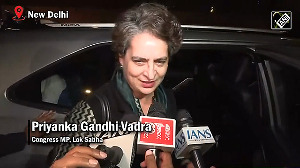The proposed investment of Rs 100,000 crore (Rs 1,000 billion) in 148 special economic zones (SEZs) will be equal to a third of what the top 300 companies in the country are planning to invest in the country over the next 18 months.
That would make the SEZ programme look like a success story in the making. However, some questions are in order. The logic of creating a special economic zone is to offer infrastructure and other facilities that cannot be provided quite so easily across the country as a whole.
In India, this would mean assured electricity, good transport links (some of the new SEZs are adjacent to ports), and, because India's labour laws are needlessly restrictive, the assurance that an SEZ will provide more flexible labour laws. All of these are understandable, and defensible.
However, if the SEZ becomes little more than a tax-dodge, then there is everything to be said for stopping this business in its tracks. India already has tax loopholes of many kinds, and does not need to add another one. The finance minister has listed in his Budget papers what it costs to provide sundry tax exemptions--the very substantial sum of Rs 158,000 crore (Rs 1,580 billion).
The government's declared policy is to bring that number down, whereas the SEZ programme seems designed to do just the opposite. If the commerce ministry is pushing for this, over-riding the finance ministry's objections, the prime minister should step in before more damage is done.
The crucial element that justifies making special provisions for infrastructure and relaxing labour laws is the additionality factor; in other words, the investment that comes into a special zone should be over and above what would have taken place in the normal course.
It is not always possible to assess such additionality, but a fair guess is certainly feasible. And the danger is that, if the primary attraction of an SEZ is the tax benefits that are offered, the investment is likely to be a diversion from the domestic tariff area. In other words, potential tax revenue would have been given away for little or no benefit.
The manner in which the SEZs are being drawn up certainly raises fears about just such a scenario.
The zones themselves are often too small--as little as 100 hectares. For some special kinds of industries (software, bio-tech, gems and jewellery), that minimum size has been reduced to 10 hectares--which is little more than the size of an industrial plot. Providing quality infrastructure in such a small area can have no real meaning.
No transport advantages would exist, for instance. And the electricity generated within the SEZ will be by a medium-sized diesel-generating unit. This is close to declaring that every large factory in the country can be converted into a special economic zone. If that is indeed what is going to come about, it would be a tax scam of monumental proportions.
The irony is that the flexibility in labour laws that should have been part of an SEZ scheme is being offered in very limited doses, as a reading of the guidelines makes clear.
While it is true that the West Bengal government has declared (to take one instance) that no trade unions will be allowed in the SEZs in the state, this is not a uniform requirement. In short, the law passed last year to make these special zones possible should be reviewed with a view to minimising the possibility that the whole programme gets misused and fails to serve public policy objectives.
Do you want to discuss stock tips? Do you know a hot one? Join the Stock Market Discussion Group.






